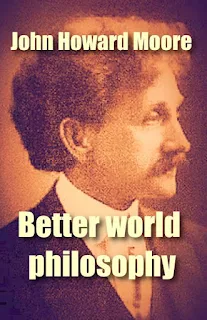Better world philosophy, a sociological synthesis by John Howard Moore
 |
| John Howard Moore |
Man, like every other animal is known to terrestrial intelligence, is a creature of desires. He is not self-sufficient. He is bound to the rest of the universe by claws of the most relentless necessity. His body is a mechanism made up of certain substances derived from the planet on which he finds himself. This mechanism is continually crumbling and wasting away and must be replenished by additional portions of the parent earth. He lives at the bottom of an aerial sea, which is so capricious that he must carry about him continually elaborate protection against its violent extremes. He must be provided with a habitation wherein to lay his head and to administer the pompous functions of the household.
He desires a soft place to sleep, many dainties on his table, and brilliants and silks to strut in. He wishes his offspring to be educated. He desires the services and society of his fellows. He desires to travel over the face of the earth, and contemplate in a general way how dull and profitless the universe would be without him. Man's desires are, indeed, innumerable, often hopeless, and sometimes vile, but they may all be rolled together into two: the desire to avoid pain, and the desire to experience pleasure. Every conscious movement made by living beings, from oyster to philosopher, is directed toward the accomplishment of one or both of these ends.
Pleasure is the emotion accompanying the achievement or satisfaction of a desire. Pain is the antithesis of pleasure. It denotes inhibited desires. The amount of happiness experienced by any being, therefore, depends, first, on his talent for enjoyment, that is, on the number and especially the intensity of his impulses; and secondly, on the attitude or character of his environment. The more numerous and ample a being's impulses, the greater his capacity for happiness — also the greater his liability to misery.
A lean subjective, a consciousness of few and feeble impulses, in a lean environment, an environment uninterested in or hostile to the satisfaction of desires, can not experience great happiness, because there is neither capacity nor opportunity. A rich subjective in a lean environment will experience great discomfort, great pain because there is a redundancy of desire over opportunity for satisfaction* A gentleman of culture, accustomed to the most refined conveniences and associations, but compelled to dwell in the squalid shelters of savages, would be profoundly wretched.
The largest emotional affluence will befall beings of ample impulses breathing the air of a man is a being of desires. And what he is here for, according to himself, is to satisfy them. He is devoted to no other thing. Every muscle he strains and every nostril he poisons are in the interests of some desire which he is striving to pacify. All of his desires men does not satisfy, but the failure is no fault of his. It is the fault of the universe that made him and in the heart of which he lives. Many of his desires he does not satisfy because he has not a genius.
He desires frequently to be in two or three places at the same time, but he is a redistributable integer. He often desires to extemporize wings, and fly away to some fair haven and be at rest, but he is not built that way. Many of the desires which he has the talent to satisfy the sacrifices. Minor satisfactions are frequently foregone for the sake of more precious ones
John Howard Moore was an American zoologist, philosopher, educator and socialist. He advocated for the ethical consideration and treatment of animals and authored several articles, books, essay
Download PDF book 4 MB.
Tags:
Sociology